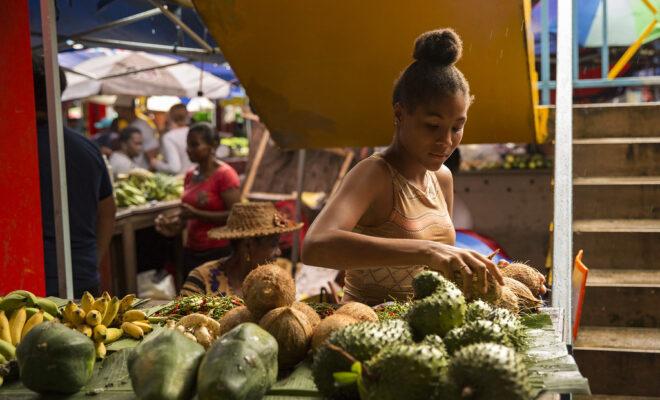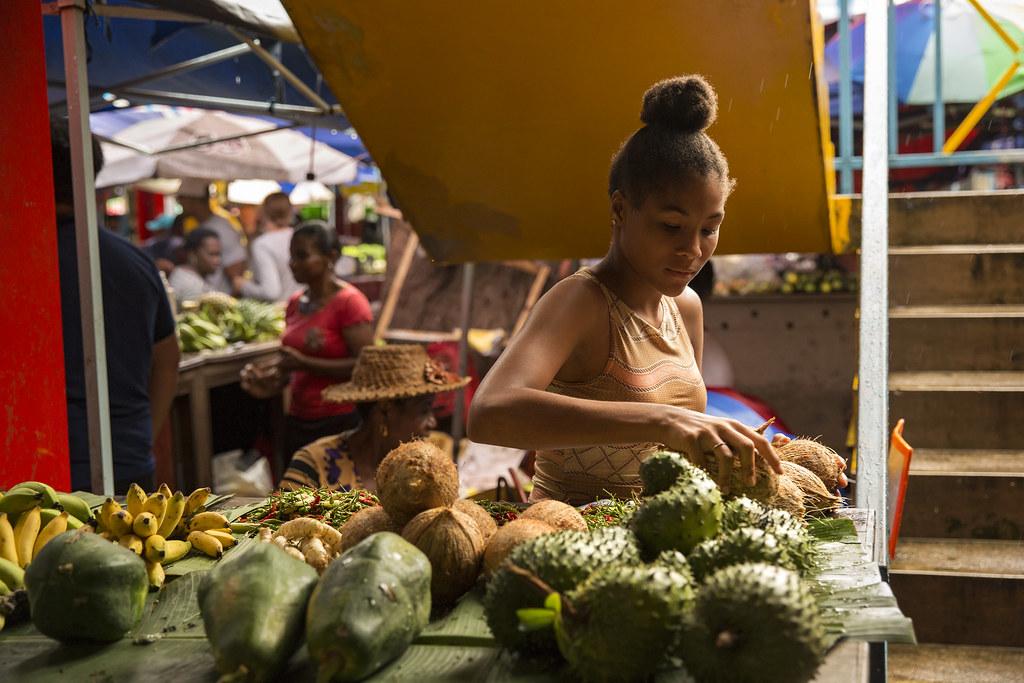Seychelles has vaccinated 71% of its population. Why is Covid surging?

What the world’s most vaccinated country tells us about variants, vaccine efficacy and achieving herd immunity.

At a market in Victoria, Seychelles. Credit: UN Women/Ryan Brown
The small archipelago nation of Seychelles has emerged as the world’s most vaccinated country for COVID-19. Around 71% of people have had at least one dose and 62% have been fully vaccinated. Of these, 57% have received the Sinopharm vaccine and 43% AstraZeneca.
Despite this, there has been a recent surge, with 37% of new cases and 20% of hospitalisations being among people who were fully vaccinated. The country has had to reimpose some restrictions.
How can this be happening? There are several possible explanations:
- The herd immunity threshold has not been reached.
- Herd immunity is unreachable due to inadequate efficacy of the two vaccines being used
- Variants that escape vaccine protection are dominant in Seychelles
- The B1617 Indian variant is spreading, which appears to be more infectious than other variants
- Mass failures of the cold-chain logistics needed for transport and storage rendered the vaccines ineffective.
What does the country’s experience teach us about variants, vaccine efficacy and herd immunity? Let’s break this down.
Variants escaping vaccine protection
There are reports of the South African B.1.351 variant circulating in Seychelles. This variant shows the greatest ability to escape vaccine protection of all COVID variants so far.
In South Africa, one study showed AstraZeneca has just 0-10% efficacy against this variant, prompting the South African government to stop using that vaccine in February. The efficacy of the Sinopharm vaccine against this variant is unknown, but lab studies show some reduction in protection based on blood tests.
However, no comprehensive surveillance exists in the Seychelles to know what proportion of cases are due to the South African variant.
The UK variant B117 is more contagious than the original strain and has become dominant in many countries. Yet its prevalence has not prevented the US achieving a dramatic reduction in COVID-19 cases through vaccination, with most people receiving the Pfizer or Moderna vaccines. Israel, where the UK variant is also dominant, has similarly seen a large drop in new cases as 60% of its population has been vaccinated with the Pfizer jab, which has a 92% effectiveness against infection, including asymptomatic infection. The UK itself has used a combination of Pfizer and AstraZeneca vaccines. With more than 50% of the population having had a single dose and almost 30% fully vaccinated, the country has also seen a significant decline in cases.
The UK is, however, experiencing a surge in northwest England where most new cases are due to the Indian variant. This variant is also causing outbreaks in Singapore, which had previously controlled the virus well.
The Seychelles needs to conduct urgent genome sequencing and surveillance to examine the effect of variants of concern and see whether the Indian variant is present. If the South African variant is dominant, the country needs to use a vaccine that works well against it. Many companies are making boosters targeted to this variant, but for now, Pfizer would be an option. In Qatar, researchers found the Pfizer jab had 75% effectiveness against the South African variant.
Achieving herd immunity
Our research at the Kirby Institute showed that, in New South Wales, Australia, using a vaccine with 90% efficacy means herd immunity can be achieved if 66% of the population is vaccinated.
If vaccines have a lower efficacy, more people need to be vaccinated. At 60% effective, for example, 100% of people need to be vaccinated to achieve herd immunity. A lower effectiveness and herd immunity is not achievable. The reported efficacy of Sinopharm is 79%. AstraZeneca’s is estimated at 62-70% from phase 3 clinical trials.
However, our calculations were made for the D614G variant of COVID-19 that dominated in 2020. This has a reproductive number (R0) of 2.5, meaning people infected with the virus on average infect 2.5 others.
Worryingly, the UK variant B117 is believed to be 43-90% more contagious, with an R0 of up to 4.75. The Indian variant B1617 is estimated to be at least 50% more contagious than that, meaning it could have an R0 of over 7. This takes us into uncharted territory and could explain the catastrophic situation in India. It also raises the stakes for vaccination, as lower efficacy vaccines will not be able to contain such highly transmissible variants effectively.
Herd immunity is still possible, but depends on the efficacy of the vaccine used and the proportion of people vaccinated.
Vaccinating the world is the only way out
As the pandemic continues to worsen in some parts of the world, the risk increases of more dangerous mutations that are vaccine-resistant or too contagious to control with current vaccines.
Keeping up with mutations is like whack-a-mole while the pandemic is raging. The take-home message for our pandemic exit strategy is that the sooner we get the whole world vaccinated, the sooner we will control the emergence of new variants.
This article is republished from The Conversation under a Creative Commons license. Read the original article.
![]()





